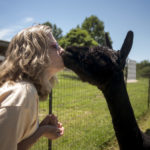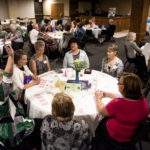Women do incredible things. Here, we feature the stories of women who are a part of the Southeast Missouri community by way of living here, being from here or passing through. We hope these stories inspire you to connect with others and that they encourage you to be who you are in the world. We need you and your unique gifts.
This story was first published in the August 2020 issue of “The Best Years (TBY).”
Rev. Edie Bird doesn’t seem like someone who often finds herself in the middle of conflict. She is not boisterous, loud or always ready to be right. She shows her belief through her actions: as one example, she can often be seen riding her bicycle around Cape Girardeau, doing her part to reduce carbon emissions and effectively steward the environment. Her soft-spoken, thoughtful demeanor is one that exudes peace and presence, a sort of quiet anchor amidst a culture that is often very, very loud.
Perhaps that is exactly why she is the person for the job.
Throughout her 31-year ministry as an Episcopal priest, Bird’s very presence has often invited conflict by the nature of her being female. Ordained in Oklahoma City in 1989, just 13 years after the Episcopal church officially began ordaining women as priests, Bird received threatening phone calls and anonymous notes directed toward her at the beginning of her priesthood. Sometimes, people in leadership positions within the church questioned her ability to lead a congregation because she was a woman. Bird says when she and other women have been met with this kind of discrimination, usually it is not an issue anymore when they do the job and people become used to the idea.
And so, although she says she would prefer to sidestep conflict, she often is tasked as the stewardess to lead people through it. This process of conflict transformation and reconciliation is what she sees as one of her most important roles as a priest.
“It’s that thing of, ‘Wherever two or three are gathered,’ which has to do with working out conflicts,” Bird says. “The whole point of a church is to engage in the practice and the process of reconciliation. That’s the ministry Jesus gave us, and he gave it really explicitly. And he even gave us different processes for how to handle it in different situations; which, he doesn’t give that kind of instruction on any other subject, so he clearly knew and wanted it to happen. So those of us who are saying, ‘Well, that’s unholy to have conflict,’ we’re the ones who are mistaken.”
Bird began her ministry working in Tulsa, Oklahoma, where she grew up. As a child, she says she was “always a very religious kid” who was “fascinated” by all religions. She recalls searching for books on major world religions at the library, reading about Buddhism and Hinduism and being drawn to monasteries, attention and the practice of elders teaching children. This led to her desire to be a priest.
Bird came to lead Christ Epsicopal Church in Cape Girardeau six years ago from Cassville, Missouri. Throughout her ministry, she has also led other churches in southwestern Missouri and northwest Arkansas, including a church in Eureka Springs, Arkansas, where she ministered for nine years. The Episcopal church, Bird says, has long been on the forefront of marriage equality; while in Cape, Bird’s congregation embraced same-sex marriage, and she performed the first wedding ceremony for a same-sex couple for the congregation. All of the congregants, she says, attended to show their love and support.
Now, 31 years into her ministry, Bird is retiring. In her retirement, she hopes to spend more time with her husband and adult children, as well as visit her parents in Tulsa. She also plans to speak at retreats and continue leading conflict transformation workshops in Cape Girardeau and throughout the U.S. It’s a practice, she notes, that is especially needed within our communities right now.
“If communities are growing and alive, they are going to have conflict because that’s part of the creative process. And in fact, if it’s not there, that’s a bad sign. That means that it may not have closed its doors yet, but that community’s probably dead,” Bird says. “But the hard thing is, the more stressed and anxious people are, the less they’re able to work with that in a creative way. And we have some cultural habits that actually stop us from working with it in the creative way and bend us toward the destructive ways.”
One of those destructive cultural habits, Bird says, is believing that people should never question the authority or the decisions of the authority within the church. She cites Acts 15 as an example of people questioning the apostles and the apostles receiving that criticism with humility. Bird is also understanding, however, of how difficult it is for churches to change because they are naturally traditional, with its members wanting to pass on what is best; she notes it is often a challenge to discern what is essential and what needs to change.
In forming these ideals, Bird studied with the Mennonites who have developed the field of conflict transformation in order to live in a society whose church embraces nonviolence.
“If you let things go, they’ll go to cut off or war. Those are the destructive ways that they’ll go toward if you just let them go. So if you have a commitment that you’re not going to do that, you have to start figuring out how to work creatively with conflict and make peace with one another, make peace with being with disagreement and the natural conflicts that happen,” Bird says. “I love it when people do calm down a little bit and start to see the potential in it and then start to work together to solve problems and they have some success, and then you can feel the atmosphere change in the community, and then that’s when trust really starts to build.”
Bird says she hopes to be able to do this work in communities as they struggle to create a place for people of all races, documenting some of the wrongs that have been done and helping people to deeply listen to each other’s stories and their families’ stories. She says she hopes to assist in putting together a listening process and to help people who are white understand their privilege, repent and make reparations.
She is grateful for all of the people she has gotten to know because of her priesthood, and the way her priesthood has allowed her to be present with people at some of the most trying times of their lives. She has loved being able to work in a place where anyone can walk in the door, ask the questions of existence and find answers, and specifically that she gets to engage with people in those conversations. She also loves seeing people come back to the church building to visit after they have moved away because the community there was a sanctuary for them during their time in Cape Girardeau.
Bird says the biggest lesson she has learned throughout her ministry is to not take things personally but to “just hang in there with people and not assume that they’re trying to hurt my feelings. They were probably just trying to tell me something that maybe I needed to know.”
No matter if she is in the middle of helping a community transform conflict or learning how to be personally transformed in this way, it comes down to one thing.
“I think faith is trust,” Bird says. “So it’s like you’re really working with the dynamic process of faith rather than using a word and confusing that word with an ideology. It’s a verb. Yeah, yeah, I’ve got to build my faith. I’ve got to faith a little more. Trust a little more.”

